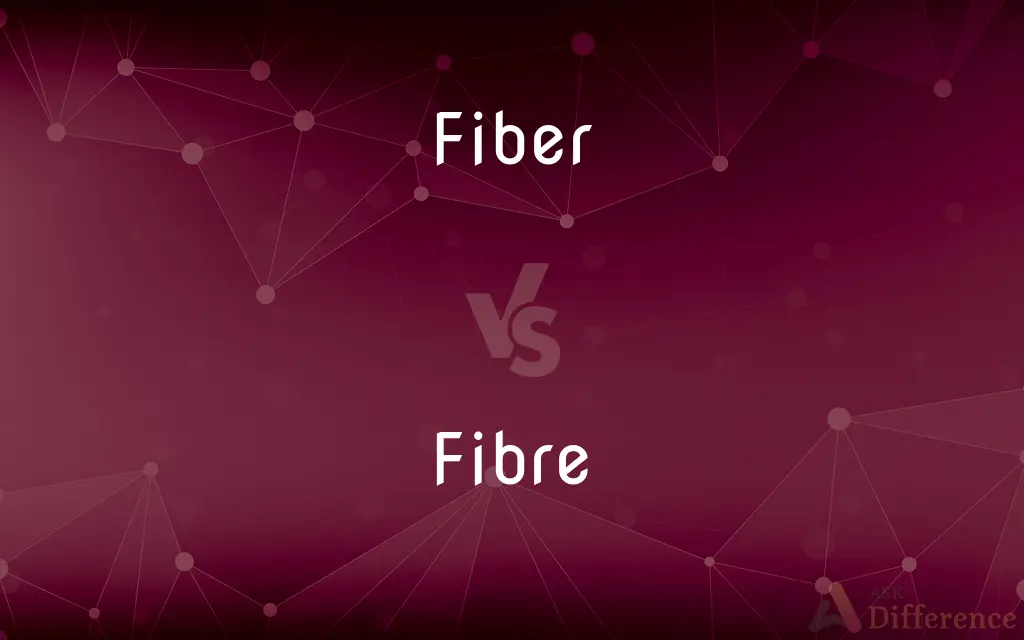Fiber vs. Fibre — What's the Difference?
By Tayyaba Rehman — Updated on November 1, 2023
"Fiber" is the American English spelling for threadlike materials or dietary roughage; "Fibre" is the British English equivalent.

Difference Between Fiber and Fibre
Table of Contents
ADVERTISEMENT
Key Differences
The term "fiber" refers to a threadlike material from which textiles are made and also to an indigestible component of food that aids in digestion, in American English. The spelling "fibre" is the British English variant, and both terms are used in various scientific and nutritional contexts. The function and meaning are the same; only the regional spelling differs.
In telecommunications, "fiber" refers to the technology used in fiber-optic cables, which transmit data as light pulses. Similarly, "fibre" in British English also pertains to the same technology. The industry recognizes both spellings, understanding they are interchangeable based on the region.
Dietary "fiber" is a key term in American nutrition guidelines, emphasizing its role in a healthy diet. "Fibre" appears in British literature, with the same emphasis on health and nutrition. Nutritionists in both the U.S. and the U.K. may speak of soluble and insoluble forms, yet the spelling varies with American and British texts.
When discussing materials, "fiber" can denote both natural and synthetic strands used in the production of fabric. "Fibre" in British contexts serves the same purpose, describing the basic structural component in textile manufacturing. Regardless of the spelling, the term conveys a fundamental concept in material science.
"Carbon fiber" is a strong, lightweight material used in advanced engineering projects in the U.S. In the U.K., "carbon fibre" refers to the same material with high tensile strength used in various industries, including automotive and aerospace. The difference lies solely in regional spelling preferences.
ADVERTISEMENT
Comparison Chart
Spelling
Fiber
Fibre
Usage
American publications
British publications
Dictionary Entries
American dictionaries
British dictionaries
Grammar Rules
American English rules
British English rules
Regional Preference
Preferred in the U.S.
Preferred in the U.K. and Commonwealth countries
Compare with Definitions
Fiber
Dietary roughage
Doctors recommend eating more fiber to aid digestion.
Fibre
Element of reinforced plastic
Carbon fibre is used in building race cars.
Fiber
Data transmission medium
The company installed fiber optics for faster internet.
Fibre
Basic entity in fabric making
The dress was woven from natural fibres.
Fiber
A component of composite materials
The bridge was reinforced with carbon fiber.
Fibre
Means of transmitting information
The new broadband uses glass fibres.
Fiber
The basic unit of textile
Natural fibers like wool and silk are highly valued.
Fibre
A textile thread
The wool fibre is particularly warm.
Fiber
Fiber or fibre (from Latin: fibra) is a natural or man-made substance that is significantly longer than it is wide. Fibers are often used in the manufacture of other materials.
Fibre
A thread or filament from which a vegetable tissue, mineral substance, or textile is formed
The basket comes lined with natural coco fibres
Fiber
A slender, elongated, threadlike object or structure.
Fibre
Dietary material containing substances such as cellulose, lignin, and pectin, that are resistant to the action of digestive enzymes.
Fiber
(Botany) One of the elongated, thick-walled cells that give strength and support to plant tissue.
Fibre
Variant of fiber.
Fiber
Any of the filaments constituting the extracellular matrix of connective tissue.
Fibre
(countable) A single piece of a given material, elongated and roughly round in cross-section, often twisted with other fibres to form thread.
The microscope showed several different fibres stuck to the sole of the shoe.
Fiber
Any of various elongated cells or threadlike structures, especially a muscle fiber or a nerve fiber.
Fibre
(uncountable) Material in the form of fibres.
The cloth was made from strange, somewhat rough fibre.
Fiber
A natural or synthetic filament, as of cotton or nylon, capable of being spun into yarn.
Fibre
Dietary fibre.
Fresh vegetables are a good source of fibre.
Fiber
Material made of such filaments.
Fibre
Moral strength and resolve.
The ordeal was a test of everyone’s fibre.
Fiber
An essential element of a person's character
"stirred the deeper fibers of my nature" (Oscar Wilde).
Fibre
(mathematics) The preimage of a given point in the range of a map.
Under this map, any two values in the fibre of a given point on the circle differ by 2π
Fiber
Strength of character; fortitude
Lacking in moral fiber.
Fibre
(category theory) Said to be of a morphism over a global element: The pullback of the said morphism along the said global element.
Fiber
Coarse, indigestible plant matter, consisting primarily of polysaccharides such as cellulose, that when eaten stimulates intestinal peristalsis. Also called bulk, roughage.
Fibre
(computing) A kind of lightweight thread of execution.
Fiber
(countable) A single elongated piece of a given material, roughly round in cross-section, often twisted with other fibers to form thread.
The microscope showed a single blue fiber stuck to the sole of the shoe.
Fibre
(cytology) A long tubular cell found in bodily tissue.
Fiber
(uncountable) A material in the form of fibers.
The cloth is made from strange, somewhat rough fiber.
Fibre
Same as fiber.
Fiber
(textiles) A material whose length is at least 1000 times its width.
Please use polyester fiber for this shirt.
Fibre
A slender and greatly elongated solid substance
Fiber
Dietary fiber.
Fresh vegetables are a good source of fiber.
Fibre
The inherent complex of attributes that determine a persons moral and ethical actions and reactions;
Education has for its object the formation of character
Fiber
(figuratively) Moral strength and resolve.
The ordeal was a test of everyone's fiber.
Fibre
A leatherlike material made by compressing layers of paper or cloth
Fiber
(mathematics) The preimage of a given point in the range of a map.
Under this map, any two values in the fiber of a given point on the circle differ by 2π.
Fibre
Plant-derived roughage
Eating plenty of fibre is essential for gut health.
Fiber
(category theory) The pullback of a morphism along a global element (called the fiber of the morphism over the global element).
Fiber
(computing) A kind of lightweight thread of execution.
Fiber
(cytology) A long tubular cell found in bodily tissue.
Fiber
One of the delicate, threadlike portions of which the tissues of plants and animals are in part constituted; as, the fiber of flax or of muscle.
Fiber
Any fine, slender thread, or threadlike substance; as, a fiber of spun glass; especially, one of the slender rootlets of a plant.
Fiber
The inherent complex of attributes that determine a person's moral and ethical actions and reactions; sinew; strength; toughness; as, a man of real fiber.
Yet had no fibers in him, nor no force.
Fiber
A general name for the raw material, such as cotton, flax, hemp, etc., used in textile manufactures.
Fiber
That portion of food composed of carbohydrates which are completely or partly indigestible, such as cellulose or pectin; it may be in an insoluble or a soluble form. It provides bulk to the solid waste and stimulates peristalsis in the intestine. It is found especially in grains, fruits, and vegetables. There is some medical evidence which indicates that diets high in fiber reduce the risk of colon cancer and reduce cholesterol levels in the blood. It is also called dietary fiber, roughage, or bulk.
Fiber
A leatherlike material made by compressing layers of paper or cloth.
Fiber
A slender and greatly elongated solid substance
Fiber
The inherent complex of attributes that determine a persons moral and ethical actions and reactions;
Education has for its object the formation of character
Fiber
A leatherlike material made by compressing layers of paper or cloth
Fiber
A threadlike material
She felt the soft fiber of the cotton dress.
Common Curiosities
Does "fiber" have different meanings?
Yes, it refers to both material threads and dietary roughage.
Is there a nutritional difference between fiber and fibre?
No, they refer to the same dietary component.
Why do "fiber" and "fibre" have different spellings?
The difference arises from American and British English conventions.
Can manufacturers label products with either "fiber" or "fibre"?
Yes, but they typically use the spelling conventional for their market.
In medical terms, is "fiber" important?
Yes, dietary fiber is important for digestive health.
How is "fiber" used in science?
It’s used to describe microscopic threadlike structures.
Does "fibre" appear in English translations?
Yes, British English translations use "fibre."
Are "fiber optics" spelled differently in the U.K.?
Yes, it's spelled "fibre optics" in the U.K.
In engineering, does "fiber" have a specialized meaning?
Yes, it often refers to materials like carbon fiber used in construction.
Can "fiber" and "fibre" be used interchangeably?
They can be used interchangeably but are region-specific in spelling.
Do textile experts differentiate between "fiber" and "fibre"?
They don't differentiate in terms of the material, only in spelling.
Will "fibre" be understood by American English speakers?
Yes, it's recognized as the British English spelling.
Should I use "fiber" or "fibre" in international communication?
Use the spelling preferred by the audience you are communicating with.
Are the chemical properties of "fiber" different from "fibre"?
Chemically, they are identical; only the spelling varies.
Is "fiber content" the same as "fibre content"?
Yes, they both refer to the amount of dietary roughage in food.
Share Your Discovery

Previous Comparison
Parentheses vs. Brackets
Next Comparison
Fish vs. FishesAuthor Spotlight
Written by
Tayyaba RehmanTayyaba Rehman is a distinguished writer, currently serving as a primary contributor to askdifference.com. As a researcher in semantics and etymology, Tayyaba's passion for the complexity of languages and their distinctions has found a perfect home on the platform. Tayyaba delves into the intricacies of language, distinguishing between commonly confused words and phrases, thereby providing clarity for readers worldwide.














































